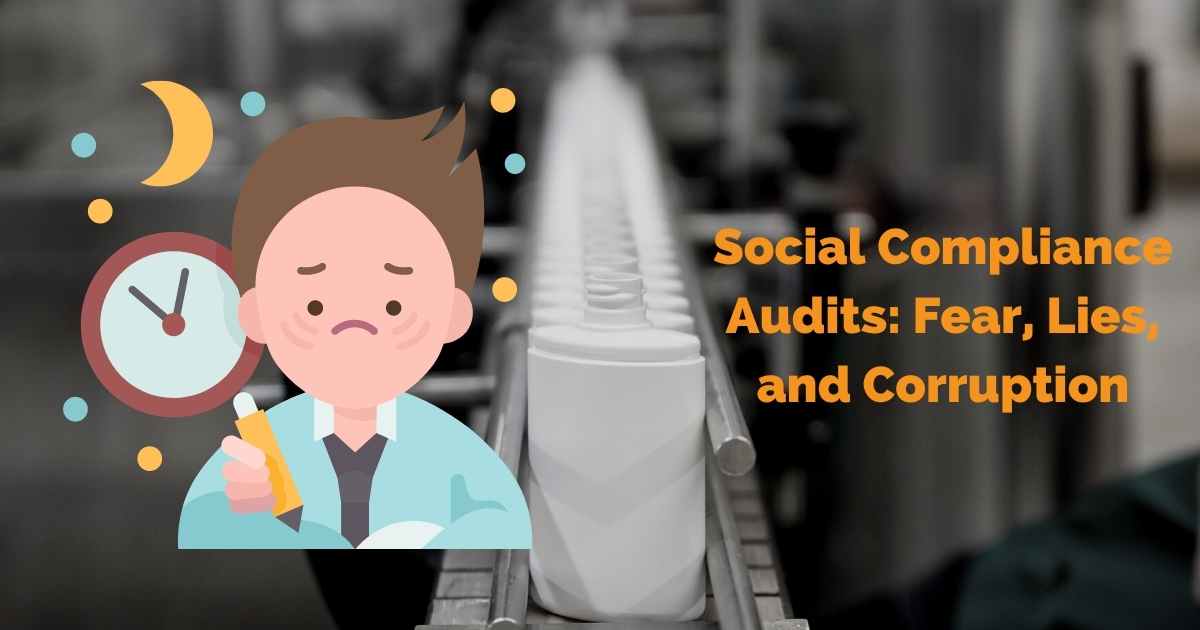
Over the weekend, I came upon a webinar that gives a relatively nice overview of the issues surrounding social compliance audits, particularly in Asia. It was shot by a new company called Mosaic.
If I had to summarize it, I’d use these three words:
- Fear of brands and retailers — they try to collect evidence of serious due diligence, to “cover their ass” in case their products are found in a factory that burned, that hired kids, or that otherwise did something shocking. The objective is not primarily to improve the situation in factories (I wrote before about how useless those audits are).
- Lies from manufacturers – to keep the business, they have to produce fake documentation and coach their employees into lying in the right way to auditors.
- Corruption of the whole system – it is easy to pick on individual auditors when it’s actually the entire system that is rotten. The webinar does a nice job pointing out the lack of independence of auditing bodies, the failure to take into account the local practices vs. what the law says, and other issues.
Social compliance can be quite toxic these days
What is amazing to me is not how bad this situation is. It is how long it has been allowed to continue!
In China, in particular, manufacturers discuss it quite openly among themselves and with their customers. In many cases, it is the importer (acting as a trader between a large retailer and a manufacturer) that sends a ‘consultant’ to teach a factory how to lie in order to pass the retailer’s audit.
Now, imagine how bad it gets in certain countries with higher levels of corruption… think Bangladesh or Vietnam…
Who should do social compliance audits?
A key question is, who should do this type of verification work?
- Governments? In many countries, CSR issues are not even on the government’s radar. And, in certain countries, the local officials and their inspectors would certainly collect bribes.
- Buyers’ local staff? In cases where the buyer hires a team to conduct those audits, it is less independent and there are virtually always integrity issues.
- Auditing companies that also audit for quality, do some testing in their labs, etc.? That’s the currently dominating model, and it is not working well.
- Maybe the companies that audit accounting books? 25 years ago, when social auditing was just starting, they were doing some of that. With ESG criteria becoming more and more important to investors, the pendulum might switch back to them. But they don’t tend to have factory auditors in the main manufacturing hubs, so I am not optimistic here.
Where should buyers spend their money and their efforts?
Most of the effort should be on preventive work (driving improvement at the factory level, providing guidance, etc.) rather than monitoring (auditing).
I found a well-thought-out article about remediation/improvement, also on the Mosaic website. It was written by the former VP of Social and Environmental Responsibility at Patagonia, one of the rare apparel & sport goods retailers that takes social & environmental sustainability seriously.
I boiled the article’s content down to 3 key elements:
- If you are serious about CSR, make sure the sourcing team, the product development team, and the rest of your company are involved. Your sourcing team should not start working with suppliers that don’t do anything about CSR, in the first place. And they should not make all decisions based on price alone.
- Be aware of what is generally accepted in a particular country, and don’t let suppliers fool you. If you play games and accept fake documentation, how will it be possible to drive improvement?
- Understand the situation at each factory and look for the root causes of the issues. For example, don’t give them large orders (relative to their capacity) with an impossibly short lead time, as that will force them to resort to extra overtime and/or subcontract.
Is it realistic?
Many buyers request that their suppliers pay for the audits, as a way to ‘earn’ a qualification as an approved supplier. And, in some cases, they nominate an auditing agency that inflates the prices of social audits… and give lower pricing to the buyer on some other services. Those buyers don’t want to change the model!
As long as that is the case, most importers, retailers, and brands will NOT increase the budget for improvement activities. It’s too easy to get suppliers to pay and get audited, without having to invest anything in the supply chain.
About 5 years ago, I was very involved in consulting for manufacturing improvements. I noticed that every time a client’s primary objective was related to social compliance, they were NOT interested in helping the factory improve its processes.
A common situation: the buyer was worried because people worked too many hours (way more than is legally allowed in China), and the best approach was re-engineering manufacturing processes to gain sufficient productivity to make those extra hours unnecessary. But they were just not interested in solving the problem at the root.
Conclusion
My conclusion is, as long the whole social compliance audits system is not shaken upside down, nothing good will come out of it…
P.S.
You may like these related articles, too:
- The rise in popularity of social compliance audits in Asian countries
- Why Conduct On-Site Social Compliance Audits? [Podcast]
- The Value of Worker Interviews during Social Compliance Audits
- Using Factory Audits To Qualify Your Chinese Suppliers
- Brands and Retailers: Please Stop Doing Social Compliance Audits in Asia

I had post regarding to the audits in supply chain, retailers and brands looking for cheap products, sourcing agencies and importers are looking for better margins. But nobody is happy to growing with manufacturers together. If someone can building up a real bridge between manufacturers and retailers or brands, to very open discussion the issues and cost, why need the commercial audit firm involved?